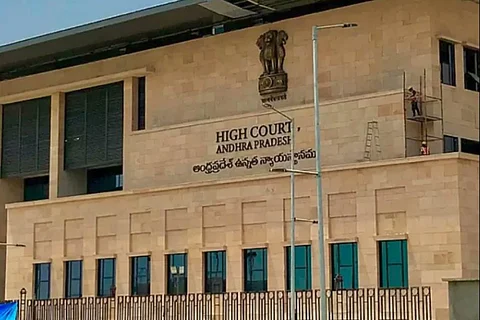

The Andhra Pradesh High Court, in a significant judgment, held that a transgender woman in a heterosexual marriage is entitled to file a complaint under section 498A (husband or relative of husband of a woman subjecting her to cruelty) of the Indian Penal Code (IPC), rejecting arguments that such protection does not extend to transgender individuals.
Justice Venkata Jyothirmai Pratapa delivered the ruling on June 16 while allowing a petition to quash criminal proceedings under Section 498A IPC and Section 4 (penalty for demanding dowry) of the Dowry Prohibition Act, 1961, filed against the husband and his family by a trans woman in 2019. While affirming the trans woman's right to file the complaint, the court ultimately quashed the criminal proceedings against her husband and his family, citing lack of specific material evidence against the accused husband and his family.
“This court makes it clear that a trans woman, who is a transgender, being in heterosexual marriage, shall have protection under section 498-A IPC,” the judge ruled.
Rejecting the petitioner’s argument that a transgender woman could not be regarded as a “woman” for the purposes of Section 498A due to her inability to reproduce, the court held, “The argument … that respondent No.2, being a trans woman, cannot be regarded as a 'woman' merely because she is incapable of biological reproduction, is deeply flawed and legally impermissible. Such a narrow view of womanhood with reproduction undermines the very spirit of the Constitution, which upholds dignity, identity, and equality for all individuals, irrespective of gender identity.”
The court relied on the Supreme Court’s landmark decisions that affirmed the rights of transgender persons and LGBTQIA+ individuals to dignity, equality, and privacy. For this, it cited NALSA v Union of India (Right to self-identification of gender recognised); KS Puttaswamy v Union of India (Privacy is a fundamental right); and Navtej Singh Johar v Union of India (Consensual same-sex relationships decriminalised).
Justice Pratapa also referred to the 2023 Supriyo v Union of India ruling (Marriage equality case), where though same-sex marriages were not recognised, the court clarified that transgender individuals in heterosexual relationships have the right to marry under existing laws.
The High Court stressed that a person’s self-identified gender must be respected and that protections under laws like IPC 498A and the Domestic Violence Act extend to trans women as well.
Specifics of the case
The complainant, Pokala Sabhana, had alleged that her husband, Viswanathan Krishna Murthy, married her in January 2019 at an Arya Samaj Mandir in Hyderabad, fully aware of her transgender identity. She claimed her family paid a dowry of Rs 10 lakh, 25 sovereigns of gold, 500 grams of silver, and household items worth Rs 2 lakh.
She further alleged that her husband deserted her soon after the marriage and later sent her threatening and vulgar messages. She added that the harassment was orchestrated by her in-laws.
However, the court, after analysing the complaint, observed that “except bald and omnibus allegations against petitioners, no prima facie case is made out.” The court added that the complaint lacked specific instances of cruelty or dowry demand and noted the allegations were vague and unsubstantiated.
“Continuation of the impugned proceedings against the petitioners/accused Nos.1 to 4 is nothing but an abuse of process,” the court concluded.